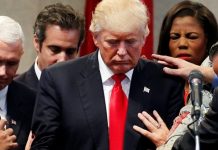 A Mississippi high school student’s objection to a religious forum on school time has succeeded in its legal challenge of the Rankin County School system and principal Charles Frazier. The school, Northwest Rankin High School, admits wrongdoing, but the legal agreement in federal court might sit imperfectly aside a new state law, SB 2633 that was passed early in 2013.
A Mississippi high school student’s objection to a religious forum on school time has succeeded in its legal challenge of the Rankin County School system and principal Charles Frazier. The school, Northwest Rankin High School, admits wrongdoing, but the legal agreement in federal court might sit imperfectly aside a new state law, SB 2633 that was passed early in 2013.
SB 2633 is known as the “Mississippi Student Religious Liberties Act of 2013,” and was part of the still-new Mississippi Republican legislature’s effort to re-address constitutional interpretation, Mississippi style, on first and second amendment issues. The law was controversial with civil liberties advocates, but popular with the state’s mostly protestant, mostly Christian majority, who felt it was a denial of their civil liberties NOT to be able to “witness” at school.
The Rankin County case centers on an action that took place before the Mississippi Student Religious Liberties Act of 2013 went into effect, and was an attempt to force students to attend an event in which local Baptists proselytized at a mandatory assembly. Teachers were accused of guarding the door to prevent anyone from leaving.
In April a letter was written to Principal Frazier by William Burgess of the American Humanist Association, outlining the nature of the complaint. The school allegedly held an assembly, allowed members of the Pinelake Baptist Church to offer a presentation and show a video designed to win believers to Christ. It was the mandatory nature of attendance that left little doubt about propriety. An unnamed minor student sought court relief through a friend, Kanwar Singh Bedhi, and that ended in a November 22, 2013 agreement.
The agreement reached indicates that in addition to paying whatever bills the school system incurred in their own behalf, they also were ordered to pay $15,000 to the plaintiff to cover legal costs. Additionally policy modification was required to address Establishment Clause issues in teaching, and the judge issued the agreed provisions “with prejudice”.
The defendants, under duress from the complaint, chose to adopt a “Religion in Public Schools” policy in July, and the resolving court document specifies they should continue this:
“to make clear and demonstrate that its policy is to fully comply with the Establishment Clause of the First Amendment of the United States Constitution.”
The Rankin County “Religion in Public Schools” policy is a brief and general statement, but prohibits school cooperation in the type of activities that were the subject of the complaint.
The Rankin County School District is not some backwoods system, but is the third largest school district in the state, with 27 schools, 3,000 employees and nearly 20,000 students. If one of the Rankin schools can run into a problem understanding student rights, it can happen anywhere in the state.
With this issue essentially settled, one might wonder what SB 2366 actually seeks. The Rankin County case falls imperfectly in the wording of the new law, but some of what occurred at West Rankin High School — pushing the envelope on public school embrace of local religious flavor — is the intent of the new law.
SB 2366 specifies certain types of religious expression allowed in classroom activities where, as in the Rankin case, attendance is mandatory, and specifically seeks to allow religious groups use of school facilities as equal to any other group use. Despite those provisions about religious commentary during class times, the law itself says no student should be forced to pray or attend any religious activity. Implicit is the fact that student religious commentary is encouraged in places where children are forced to be attending and that discussion then becomes part of the teaching dialog.
The law seeks to carefully turn the free-speech portion of the First Amendment against the current interpretations of the Establishment Clause of the same amendment. It is the Establishment Clause that is the basis for legal concepts of the separation of church and state. Evidently the primary thrust of the Mississippi law is to attempt to redefine Establishment Clause issues by claiming they are free speech issues. The law is largely the product of Tea Party-backed legislators with relatively little experience at legislating, and contains some contradictions.
Section 6 of SB 2633 states :
SECTION 6. This act shall not be construed to authorize this state or any of its political subdivisions to do either of the following: (a) Require any person to participate in prayer or in any other religious activity. (b) Violate the constitutional rights of any person.
Section 6 would therefore appear to deny Rankin County the right to force a student to attend any religious activity, although the way it was worded, a “religious activity” does not include a student’s protected religious speech, even during class time. What the law does seek to do is allow and to protect class time religious discussion and religious answers to class and homework questions.
In addition the law seeks to open the school to religious group presentations like the Rankin program, as long as there are students involved and no forced attendance. The indirect Section 6 nod to the US Establishment Clause and the decisions of the courts, appears to be in direct conflict with the central aim of the bill, to allow and promote more student religious expression in school.
Section 7 denies limiting school authority to act constitutionally, evidently as a backup protection, in case it overstepped:
SECTION 7. This act shall not be construed to limit the authority of any public school to do any of the following: …(c) Adopt and enforce policies and procedures regarding student speech at school provided that the policies and procedures do not violate the rights of students as guaranteed by the United States and Mississippi constitutions and laws…
The disclaimers in Sections 6 and 7 basically seem to indicate that if there is a conflict with federal law, which the framers evidently designed the bill to have, the bill shall not be construed to conflict with that. The law seeks several specific rights and establishes procedures, some of which appear almost as conflicting as the disclaimers, and some of which are already rights well established.
First, the law seeks to legitimize religious statements and discussion in public school, by students and parents, and it does this by putting religious expression as equal to any other type of expression, within thin limits.
Second, students are given rights to religious expression in academic assignments, and instructed to be graded on merit without penalization or prohibition of religious content. In other words, if a student wants to talk about a 3,000 year old “new Earth” concept, in a science class, he shall not be penalized for it, and the teacher can deal with it in a not-quite-specified manner.
Second, the law introduces a procedure whereby some students “holding positions of honor” may speak at “non-graduation” events, and express religious subject matter as equal to secular opinions. The law specifies how the school is to select these students for these football game types of events.
Third, student religious organizations are given specifically equal rights to any and all activities that are open to a group with any secular purpose.
Fourth, the law seeks to elaborate some criteria for selecting students qualified to speak publicly, ostensibly on the religious matters that are the subject of the law, provide disclaimers for official school position “as needed”, and otherwise manage the guaranteed rights. For instance, it floppily limits student speakers at these ceremonies and non-graduation events to:
“student council officers, class officers of the graduating class, the top three (3) academically ranked graduates, or a shorter or longer list of student leaders as the school district may designate. “
Sections 6 and 7 attempt, almost as an afterthought, to insert a respect for US and state constitutional law as limiters in interpretation of this law, probably because the law could easily be seen to violate those pre-existing protections.
Critics, including the ACLU, have viewed some of SB 2633 as a pander to the state’s anti-federal forces and a semantic attack on case law defining separation issues. Part of it grants rights already upheld for students.
This bill was crafted by a conservative coalition in the state senate that trends toward a battle stance with much of federal government and a desire to allow states to decide exactly which rights are granted to its people and how they are delivered. It is a very old “state’s rights” issue common to Mississippi since before the Civil War. The bill’s sponsor, Senator Chris McDaniel, also reportedly crafted a legal objection and failing constitutional challenge to the Affordable Care Act. He is a member of the American Family Association, and has Tea Party support. McDaniel after one full term as a state senator seeks to acquire US Senator Thad Cochran’s national senate post to bolster the far right power grab on Washington.
Mississippi politics often seems to revolve on culture war issues of gun rights, gay rights and school prayer where politicians appear to attempt to nullify federal laws, but to no real effect except political appeal crafted using state funds.
This law, which the ACLU says will likely launch a court challenge, has other, almost comedic twists. Democratic Attorney General Jim Hood, a rare Democrat in a statewide office, will be the likely defender of the bill when a federal court challenge is launched, and could easily lose it — with political implications. Additionally, individual principals and school districts could be defendants, as with the Rankin case, and further spread the cost of defense away from the people who crafted the bill.
This law seems to totally oppose the idea that has driven many court cases on the constitutionality of religion in the public sector — the idea that the best and only way to ensure religious fairness to even minority religions is to make sure the government favors no religion.
In context, Mississippi politics has been described as a landed ruling class that enlists the aid and passion of the white working majority against the lower classes in the state, and fighting a federal foe on almost-religious topics has long been central to this strategy. Historically, if you satisfy the “rebels” in Mississippi and fight the federal government and Mississippi blacks, you guarantee your time in office. SB 2633 is a classic in that respect, as religion is a strong culture war theme in the state. Selling the rights of the small religious minority in the state to the Christian right, thumbing your nose at the feds, and opening up the schools for peer pressure and souls, like at West Rankin, is a very Mississippi thing to do.
Edited/Published by: SB





